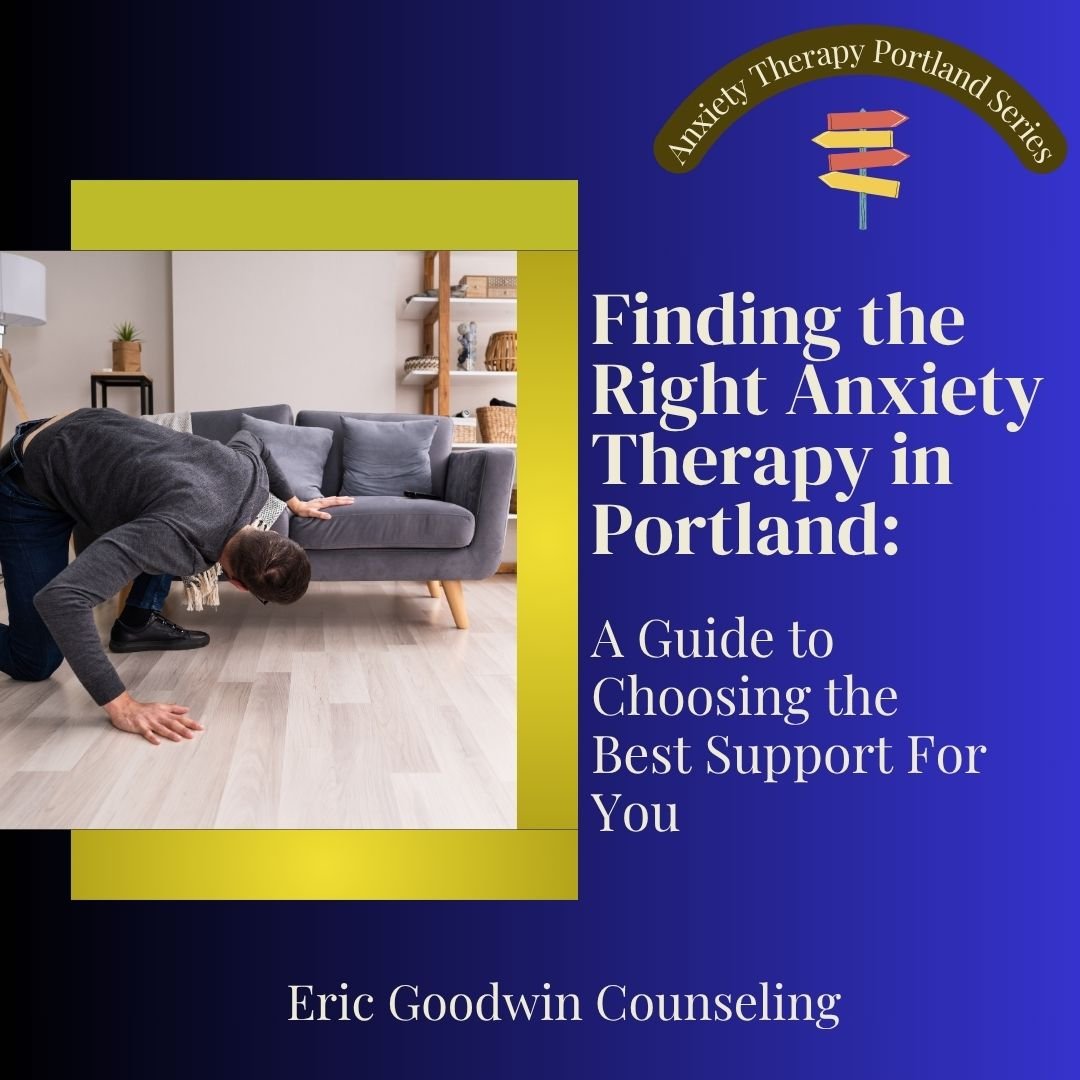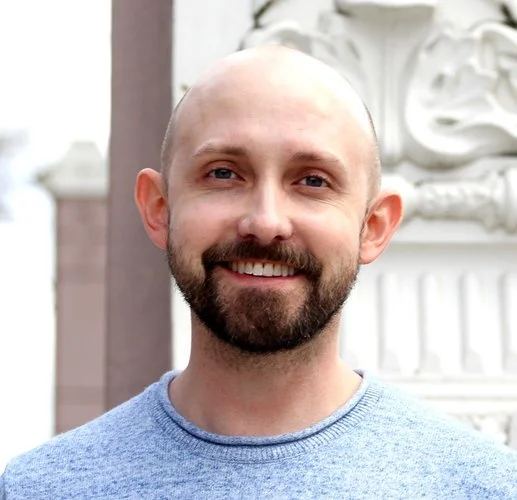Finding the Right Anxiety Therapy in Portland: What to Look For and Where to Begin
Why is Finding An Anxiety Therapist in Portland So Overwhelming?
Struggling with finding anxiety therapy in Portland? You're not alone, and you don't have to figure this out on your own, either. The search for the right anxiety therapist can be overwhelming, especially in a city like Portland where wellness and mental health are deeply valued but therapy options are vast and varied.
You might be scrolling through directories, reading bios that all start to blur together, wondering: "How do I know who’s actually going to help me feel better?"
Maybe you’re trying to find someone who feels safe. Someone who gets the social anxiety, the panic spirals, the overthinking, the self-doubt. Maybe you’re searching for someone LGBTQ+ affirming. Maybe it’s mindfulness-based care you’re drawn to. Or maybe you’re simply exhausted from trying to figure it out on your own.
Let’s take a breath. I’d like to walk you through this, gently and clearly, so the process of finding anxiety therapy in Portland can feel more like a step toward healing, and less like a scavenger hunt with no map.
Why Is It So Hard to Find the “Right” Therapist in Portland?
Portland is rich in therapists. While that is a good thing, the downside is that all the choice can feel paralyzing. There are dozens of therapists on each platform, with different styles, credentials, and jargon. Some offer EMDR, others CBT. Some emphasize trauma. Some mention mindfulness. Others keep it vague. And that can make it hard to know what you actually need.
The truth? Finding the right anxiety counseling isn’t just about credentials. It’s about connection.
And sometimes, the first step is simply figuring out what kind of connection you’re looking for.
Hi, I’m Eric Goodwin, and I help people in Portland find relief from anxiety.
I’m a licensed professional counselor who works with those of us who are navigating anxiety, perfectionism, identity stress, and the sense that life feels overwhelming even when things look fine on the outside. If you’re looking for anxiety therapy in Portland, I’d love to help.
My approach combines mindfulness, self-compassion, and relational depth. Together, we look at the patterns that are keeping you stuck, build tools to manage anxiety in daily life, and create space for a more empowered relationship with yourself. My work is LGBTQ+ affirming and trauma-aware.
Whether you're dealing with daily dread, panic attacks, or a chronic sense of unease, you deserve support that actually helps. You don’t have to figure this all out alone. Let’s explore some questions and topics to help you find the best anxiety therapist for you.
What Should You Look For in Anxiety Therapy?
There’s no one-size-fits-all approach to anxiety counseling. But there are some qualities and experiences that tend to really matter, especially if you’ve tried therapy before and didn’t feel that it truly helped.
Let’s highlight a few important things to consider:
A Focus on Anxiety
Therapists who specialize in anxiety often have deeper tools and more nuanced insight into what anxiety really feels like. It’s not just about worry. It’s the racing mind, the constant scanning for danger, the tight chest, the perfectionism, the fear of being “too much” or “not enough.” A generalist might be helpful, but someone who has dedicated time and energy to understanding anxiety can help you more efficiently and effectively.
You can think about it like going to the doctor. A general practitioner can help with a variety of health issues, but they will most likely refer you to a specialist when you are seeking care for a specific recurring concern.
A Style That Matches You
If you crave structure and want practical tools, modalities like CBT (Cognitive Behavioral Therapy) can be helpful. If you're drawn to slowing down and tuning into the present moment, mindfulness-based therapy may feel more like home. Some people need space to reflect and explore; others want a roadmap. A good therapist will tailor the process to you, but it helps to know (or have reflected on) your preferences.
A Supportive Approach for Queer Clients
If you’re part of the LGBTQ+ community, it’s not enough for therapy to be “inclusive.” It needs to be affirming. That means your therapist actively celebrates your identity, understands the stressors that can come from navigating the world as a queer or trans person, and doesn’t make you do extra emotional labor to explain your life. Keep an eye out for therapists who communicate that they specialize in LGBTQ+ affirming therapy alongside their expertise with working with anxiety.
Mindfulness and Self-Compassion
Anxiety often brings along a robust constant inner critic for the ride. A voice that says, “Why can’t you just calm down?” or “You’re too sensitive.” That’s why approaches like mindfulness-based therapies and self-compassion can be so transformative. Rather than fighting anxiety with more judgment, these approaches help you respond with gentleness, presence, and acceptance.
How Anxiety Therapy Can Actually Help
Anxiety isn’t something we can “just think our way out of.” Many of us have tried (myself included). It’s wired into our nervous systems. Therapy can help you learn how to respond to your anxiety instead of being controlled by it. In our work together, that might look like learning how to regulate your nervous system so that you can feel grounded in moments of overwhelm. We might gently challenge unhelpful thought loops, not by forcing logic over emotion, but by bringing curiosity and care to the patterns that keep you stuck. You’ll have the chance to build self-trust, so you're not always second-guessing yourself. We’ll explore tools like mindfulness, breathwork, or body awareness that work in real time. And over time, we’ll look at the deeper roots of anxiety (perfectionism, people-pleasing, identity pressure…any of these feel familiar?) so you can begin to reclaim energy, presence, and a more compassionate relationship with yourself.
Therapy isn’t about “fixing” you, it’s about shifting how you relate to yourself. It’s about creating more room to feel secure, supported, and fully you.
For the LGBTQ+ Community, Anxiety Often Has Extra Layers
If you’re queer or trans, anxiety may show up in ways that others don’t always understand. Microaggressions, family tension, fear of judgment, identity-based trauma, pressure to perform or “represent”, these aren’t just stressors. They’re lived experiences that deserve attention and care.
Therapy can help you not just “cope,” but also heal, deconstruct internalized messages, and build self-worth on your own terms.
Tips for Finding the Right Therapist in Portland (Without Burning Out)
Now, let’s make this process feel more doable. Here a few real-world tips:
Use Local, Values-Aligned Directories
Try Portland Therapy Center, Inclusive Therapists, or TherapyDen. These often have filters that let you searched based on the therapists’ identities and approaches and also by payment and insurance options, location, and more.
Look Beyond the Buzzwords
Many therapists bios sound similar. Look for specific language that shows lived understanding, not just “welcoming” statements. Do they mention working with anxiety directly? LGBTQ+ clients? With mindfulness or another framework you’re interested in?
Ask the Questions that Are Important to You
Most therapists will often a free consultation. I recommend lining up at least 3 to get started so that you can get a sense of what different therapists’ approaches are like and how you respond to them.
Consultations provide an opportunity to ask meaningful questions like:
“How do you typically work with anxiety?”
“Are your sessions more structured or open?”
“What’s your experience with LGBTQ+ clients and anxiety?”
You’re allowed to interview your therapist, your comfort matters.
What Would It Feel Like to Be Understood?
Pause to ask yourself: “What would if feel like to have support from someone who truly gets it?”
Someone who doesn’t minimize your fears. Who doesn’t pathologize your identity or experiences. Who sees you fully, and helps you move from surviving to thriving.
You don’t have to keep navigating this on your own. If any part of this blog resonated with you, I hope you’ll reach out.
Ready to Begin Anxiety Therapy in Portland?
Eric Goodwin, Licensed Professional Counselor, helps clients explore what kind of anxiety therapy is the best fit, offering LGBTQ+ affirming, personalized care in Portland and online throughout Oregon.
If you’re looking for anxiety therapy in Portland, I invite you to schedule a free 15-minute consultation. We’ll talk about what’s going on, what you’re needing, and whether we might be a good fit.
You can call me directly at (971) 533-5590 or send a message through my contact page. I offer in-person sessions in Portland and online therapy across Oregon.
Frequently Asked Questions: Finding the Right Anxiety Counseling in Portland
1) What qualifications should I look for in an anxiety therapist?
It’s important to find a therapist who combines specialized training in anxiety with qualities that help you feel safe and understood. You may look for:
Experience treating anxiety disorders and panic.
A therapeutic approach that suits you, whether it’s a more structured approach like CBT, a trauma-informed approach like EMDR, or an experiential approach like mindfulness.
A warm, relational style that fits your comfort level. Why it matters: Research highlights that a good “fit” is often more predictive of positive outcomes than the specific techniques used.
2) Is looking for online therapy effective for working with anxiety?
Yes! Online (telehealth) therapy is effective, often on par with in-person sessions, for working with anxiety. It offers flexibility, possibility for creating more comfort (depending on what space you use for your sessions), and improved access, especially useful if in-person care is limited, logistically challenging, or you have very few therapists in your area.
3) How long will it take to feel better with counseling for anxiety?
This is definitely an “everyone’s experience will be different” answer, and for sound reason. Our experiences with anxiety are going to be as unique to each of us as we as people are distinct from one another.
Generally, most clients will begin to notice meaningful shifts in weeks or a few months. Therapy isn’t a straight line, it’s an experience built over time. Consistency, open communication, and practicing tools outisde of sessions all help to bolster your experience and healing.
Some approaches are more short-term and structured and others more exploratory and encouraging of deeper understanding. Either way, breaking down experiences of anxiety into manageable patterns is what helps to create real, sustainable change.

